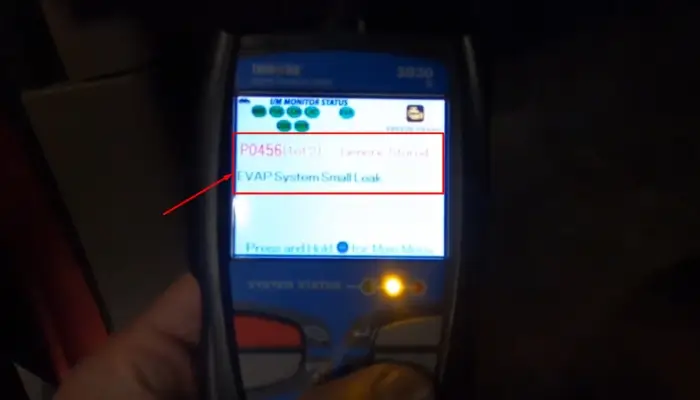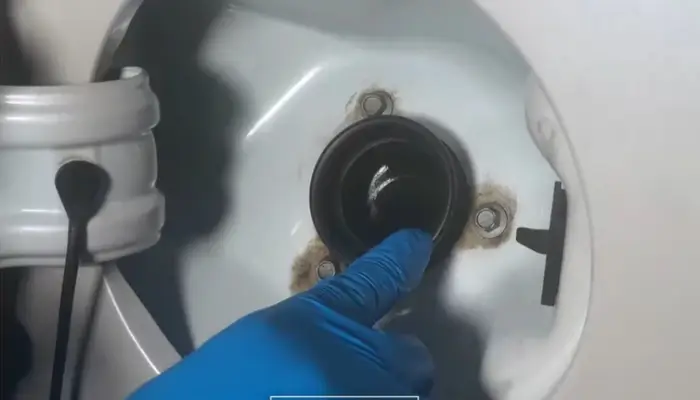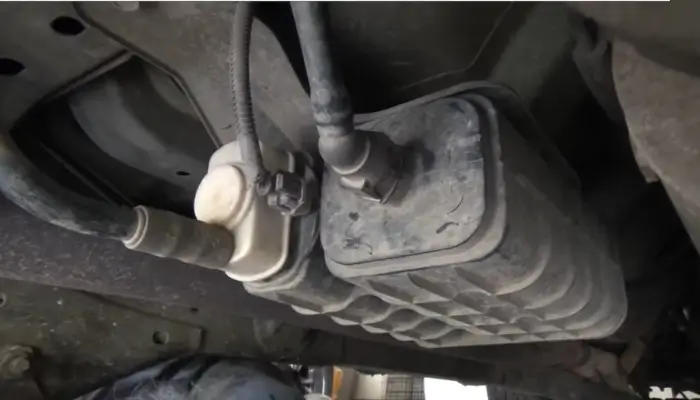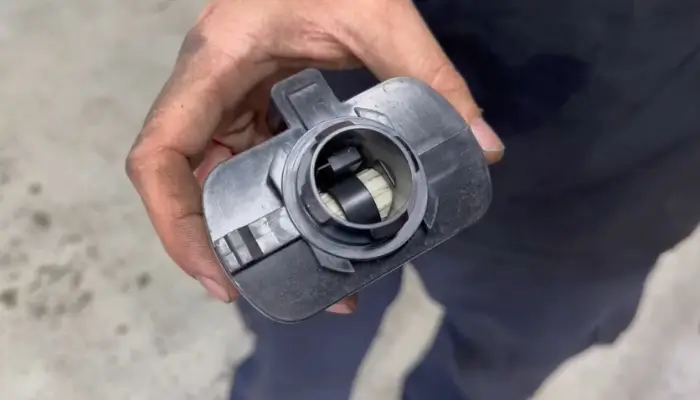When your Jeep Patriot’s check engine light suddenly illuminates, it’s often a cause for concern. One common culprit is the P0456 code, which indicates a small evaporative emission system leak. Don’t worry – this guide has got you covered! We’ll delve into the specifics of the P0456 code, explore its potential causes, and provide practical solutions to fix the issue and get you back on the road. Let’s embark on this journey of understanding and troubleshooting.
What is the P0456 Code?

The P0456 code refers to a potential leak detected in the evaporative emission system of your Jeep Patriot. This system captures and stores fuel vapor that would otherwise escape into the atmosphere, contributing to air pollution. If there’s a leak, fuel vapor escapes when it shouldn’t, increasing harmful emissions.
Common Causes of the P0456 Code
There are several potential culprits behind the P0456 code. It’s often triggered by:
Several factors could trigger the P0456 code in your Jeep Patriot. Common culprits include:
Loose or Missing Gas Cap

A loose or improperly secured gas cap is a common trigger for the P0456 code in your Jeep Patriot. Easily resolved by tightening or replacing the cap, it prevents air from entering the system, which would disrupt pressure balance and trigger the code.
Faulty Evaporative Emission Canister

Cracks or leaks in the emission canister can emit fuel vapors, causing the P0456 code. Replacing the canister effectively restores the system’s ability to contain and manage fuel vapors, addressing the root cause of the issue.
Leaks in Hoses and Connections
Wear, damage, or deterioration of hoses and connections within the emission system can lead to leaks and the P0456 code. Thoroughly inspecting and repairing these components ensures proper functionality and prevents vapor escape.
Defective Purge Control Valve

A malfunctioning purge valve disrupts the balance of fuel vapor release, triggering the P0456 code. Replacing the valve restores the emission system’s pressure equilibrium, effectively resolving the issue.
Issues with the Fuel Filler Neck
Damage to the fuel filler neck or seal can lead to vapor leaks, causing the P0456 code. Repairing or replacing the damaged parts restores the system’s integrity and prevents further emissions-related concerns.
Read also: Causes of Code P06DD Jeep Cherokee
Symptoms of a P0456 Code
When confronted with a P0456 code, it might not immediately impact your Jeep Patriot’s overall performance. However, dismissing it would be unwise due to the potential consequences. Several common symptoms associated with this code are:
Illuminated Check Engine Light
One of the primary indicators of a P0456 code is the illumination of the check engine light on your dashboard. This serves as a warning that an issue within your vehicle’s emissions control system requires attention.
Smell of Fuel Odor Around the Vehicle
Another noticeable symptom is the presence of a fuel odor around your Jeep Patriot. This scent could arise from the release of fuel vapors due to the small leak in the evaporative emission control system, which the code signifies.
Decreased Fuel Efficiency
The efficiency of your vehicle’s fuel consumption may take a hit due to the P0456 code. The leak in the emissions system can cause fuel vapors to escape instead of properly utilized, leading to decreased mileage.
Failed Emission Tests
If your Jeep Patriot undergoes emission testing, a P0456 code could lead to test failure. The code signifies an issue with the emissions control system, which is a critical component of meeting emission standards.
Read Also: Jeep Wrangler’s P06DD Code Symptoms
Diagnosing the Issue: Step-by-Step Guide
Check the Gas Cap
To diagnose the P0456 code in your Jeep Patriot, start by scrutinizing the gas cap. Confirm that it’s tightly fastened without any apparent damage. A loose or damaged cap can lead to vapor leakage and trigger the code, so ensuring a secure seal is crucial.
Inspect Hoses and Connections
Conduct a comprehensive inspection of all hoses, pipes, and connections within the evaporative emission system. Look for signs of wear, damage, or detachment. Leaks in these components can cause improper pressure and code activation, making a thorough examination paramount.
Examine the Canister
Thoroughly inspect the evaporative emission canister for cracks or leaks. If any are detected, prompt action is necessary. Replacing a compromised canister ensures that the fuel vapor containment system is restored, effectively addressing the cause of the P0456 code.
Test the Purge Control Valve
Utilize a diagnostic tool to assess the functionality of the purge control valve. If the valve is faulty and fails to regulate fuel vapor release adequately, the emission system’s balance is disrupted. Replacing the valve, if required, restores proper vapor management and resolves the P0456 code.
Check the Fuel Filler Neck
Investigate the fuel filler neck and its rubber seal for damage. Confirm that they form a secure and effective seal. Damage to these components can lead to vapor leaks and the triggering of the P0456 code, making their examination and repair crucial for resolution.
Fixing the P0456 Code: Practical Solutions
Once you’ve pinpointed the issue, it’s time to address it and clear the P0456 code:
Tighten or Replace Gas Cap
Once the issue triggering the P0456 code is identified, take action by tightening the gas cap until you hear a reassuring click. If the cap is damaged, opt for a replacement. Addressing this straightforward yet crucial step prevents vapor leaks caused by a loose or faulty gas cap, effectively resolving the code.
Replace Faulty Canister
If your investigation reveals a cracked or leaking evaporative emission canister, replacing it is the optimal solution. This proactive step ensures that the system functions as intended, preventing fuel vapor escape and rectifying the root cause of the P0456 code, promoting both effective emission control and vehicle performance.
Repair or Replace Hoses
Confront any identified leaks or damage within the complex network of hoses and connections. Sometimes, replacement of the affected parts is necessary. Addressing leaks restores the integrity of the emission system, preventing fuel vapor release and resolving the underlying cause of the P0456 code.
Replace Purge Control Valve
If a malfunctioning purge valve is identified as the culprit behind the P0456 code, prompt replacement is essential. Swapping out the faulty valve ensures the proper release of fuel vapor from the charcoal canister, restoring the pressure balance within the system and effectively clearing the code.
Repair Fuel Filler Neck
In the event of damage to the fuel filler neck or its seal, prioritize repair or replacement. This action eliminates vapor leaks at the point of fueling, addressing the trigger of the P0456 code. Ensuring a secure and properly functioning fuel filler neck promotes emissions control and prevents further issues related to vapor escape.
Read also: How to Fix Code p161b Jeep Compass
Preventing the P0456 Code
Maintaining your vehicle regularly is a proactive approach to warding off the P0456 code. Follow these guidelines to minimize the likelihood of encountering this issue:
Always Tighten the Gas Cap Properly After Refueling
After refuelling your Jeep Patriot, ensure the gas cap is securely tightened. A loose or improperly sealed gas cap can lead to fuel vapor leaks, triggering the P0456 code.
Check Hoses for Wear and Tear During Routine Inspections
Regularly inspect the EVAP system hoses for signs of wear, cracking, or disconnections. Damaged hoses can allow fuel vapors to escape, leading to the code’s activation.
Follow the Manufacturer’s Recommended Maintenance Schedule
Adhere to the maintenance schedule outlined by the manufacturer. Regular inspections and tune-ups can identify potential issues early, preventing the P0456 code and other problems from arising.
Seeking Professional Help
When troubleshooting and DIY solutions fall short, turning to the expertise of a qualified mechanic is the recommended course of action. Their proficiency in diagnosing and resolving issues related to the P0456 code ensures effective solutions tailored to your Jeep Patriot’s needs.
Taking Care of Your Jeep Patriot’s Emissions System
Caring for your vehicle’s emissions system goes beyond addressing the P0456 code. Regular maintenance not only prevents codes but also contributes to a cleaner environment. Timely checks of hoses, valves, and other components can nip potential problems in the bud.
Adhering to recommended maintenance schedules ensures efficient fuel vapor management and minimizes emissions. By taking these steps, you ensure your Jeep Patriot remains eco-friendly and runs smoothly, protecting your vehicle’s performance and the planet.
Wrapping Up
Dealing with the P0456 code in your Jeep Patriot doesn’t have to be a daunting task. By understanding the basics, diagnosing the issue step by step, and implementing the practical solutions we’ve discussed, you can resolve the problem and ensure your vehicle runs smoothly while minimizing its environmental impact. Remember, when in doubt, consulting a professional mechanic can provide you with the expertise needed to get your Jeep Patriot back in top shape.
FAQs
Can a loose gas cap trigger the P0456 code?
Yes, a loose or improperly secured gas cap is one of the most common triggers for the P0456 code.
How much does it cost to repair a faulty charcoal canister?
The cost of repairing or replacing a charcoal canister can vary depending on the make and model of your vehicle, as well as your location. It’s best to consult a mechanic for an accurate estimate.
Can I still drive my Jeep Patriot with a P0456 code?
While you might be able to drive with a P0456 code, it’s not advisable. Ignoring the issue can decrease fuel efficiency and potential emission test failures.
What is the role of the EVAP system in my Jeep Patriot?
The EVAP system, or evaporative emission control system, prevents the release of fuel vapors into the atmosphere. It directs these vapors into a charcoal canister for storage until the engine can safely burn them.
How often should I have my Jeep Patriot’s emissions system checked?
It’s recommended to have your emissions system checked during routine maintenance, typically according to your vehicle manufacturer’s guidelines. This can help catch and address issues like the P0456 code early on.

